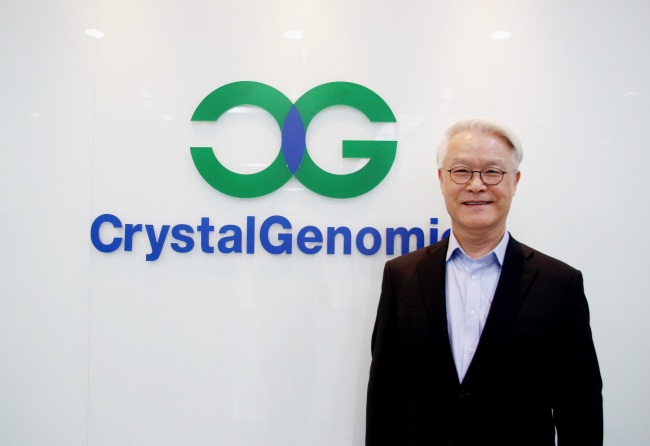[Herald Interview] ‘Biosimilars have no long-term prospect’
Former exec in LG Life Science’s R&D Biotech Research Institute says novel drug development is critical for Korea
By Lim Jeong-yeoPublished : March 27, 2019 - 15:17
Korean conglomerates are diving in to the field of biotechnology one after another, but they have no long-term prospects if biosimilars are the only area they invest in, says Cho Joong-myung, a 71-year-old bio-venture founder who has dedicated his life to the research and development of novel drugs.
Cho served as senior vice president and director of research and development at Biotech Research Institute of LG Life Science (then LG Chemical) from 1984 to 2000. The lab started with only a handful of researchers, but over Cho’s tenure the number of researchers grew to 250.
When LG Chemical halted anti-cancer, antigen research projects between 2000 and 2005 in favor of generic chemical drugs, however, nearly half of the researchers left the company gradually over time. About 30 started their own bio venture startups. Cho was one of the first to leave.
Cho served as senior vice president and director of research and development at Biotech Research Institute of LG Life Science (then LG Chemical) from 1984 to 2000. The lab started with only a handful of researchers, but over Cho’s tenure the number of researchers grew to 250.
When LG Chemical halted anti-cancer, antigen research projects between 2000 and 2005 in favor of generic chemical drugs, however, nearly half of the researchers left the company gradually over time. About 30 started their own bio venture startups. Cho was one of the first to leave.

LG’s research institute, meanwhile, has 415 researchers as of 2018. The firm has pipelines of six chemical drugs and four bio drugs covering cancer, autoimmune disease and leukemia, as well as three vaccines.
According to Cho, gone are the days when chemical generic drugs were the best action plan for Korean companies. In the not-too-distant future, Cho says the same could be said for biosimilars -- albeit slightly precocious foretelling.
Both generic and biosimilar medicines are copies of original drugs whose patents have expired. What differentiates the two are that generic drugs have to do with chemical structure, while biosimilars concern the cells they are based on. Biosimilars have many more variables and are harder to produce. They could only be “similar” and “almost identical” to the original drug they reference. Biosimilars are much hyped in Korea at the moment, with major biopharma firms jumping in.
Cho claims, “Especially with China and India close behind the tail, Korea would stand no chance in terms of price competitiveness given the other two countries’ cheaper manpower.”
For Korea to have a chance as a leader in the biopharmaceuticals field, conglomerates and the government must turn their attention to fostering long-term research and development for novel drugs, he said.
Innovative drugs take at least 10 years to commercialize and require tens of billions of won, as they must run various clinical trials in each market the drug wishes to enter. Copy drugs, on the other hand, require proving their similarity or identicalness with the original blockbuster that has already proved its safety and efficacy. If a bio venture with the technology teams with a corporation with funds, the way to novel drug developments could be better paved, he said.
CrystalGenomics, led by Cho, has a unique position in that it claims to be the only Korean company with the technology to crystalize proteins and target different effects of a drug to wanted parts of the human protein. The firm’s first breakthrough came with an Acelex (polmacoxib) capsule in 2015, which is a novel nonsteroidal anti-inflammatory drug used to treat osteoarthritis. Acelex is the first Korean-made novel drug from a bio venture – the 22nd out of 30 total drugs.
Under contract, Daewoong Pharmaceutical sells Acelex to hospitals with less than 300 beds and Dong-a ST sells to medical institutes with over 300 beds. CrystalGenomics is expecting to commercialize Acelex in the Middle East this year. Lebanon is the first country expected to yield results.
CrystalGenomics as of 2019 has about 70 employees, most of whom are researchers, save for 10 in management. About 20 have doctorates in the bio field, with the rest holding master’s degrees.
Another CrystalGenomics novel drug candidate is CG-806, a first-in-class FLT3/BTK multi-inhibitor to treat acute myeloid leukemia. CrystalGenomics licensed out CG-806 to Canada’s Aptose Science to commercialize the drug outside of Korea in a deal worth 494 billion won ($435.4 million) in 2016 and 2018.
This deal with Aptose is what pushed CrystalGenomics’ yearly postings to the black in 2018 for the first time since the company listed on the secondary bourse Kosdaq in 2006. Aptose has patented CG-806 in the US, Japan, China, Turkey, Australia, Europe and Russia so far. The US Food and Drug Administration on Monday accepted Aptose’s investigational new drug application for CG-806.
Cho’s goal for CrystalGenomics is to have two novel drugs approved by the US FDA in the next five to 10 years. The firm currently has nine projects for pain and inflammation, infectious disease and immuno-oncology treatments. Cho also envisions establishing research centers near Oxford in England and in California to create a round-the-clock research company.
By Lim Jeong-yeo (kaylalim@heraldcorp.com)








![[KH Explains] Hyundai's full hybrid edge to pay off amid slow transition to pure EVs](http://res.heraldm.com/phpwas/restmb_idxmake.php?idx=644&simg=/content/image/2024/04/18/20240418050645_0.jpg&u=20240419100350)






![[From the Scene] Monks, Buddhists hail return of remains of Buddhas](http://res.heraldm.com/phpwas/restmb_idxmake.php?idx=652&simg=/content/image/2024/04/19/20240419050617_0.jpg&u=20240419175937)

![[KH Explains] Hyundai's full hybrid edge to pay off amid slow transition to pure EVs](http://res.heraldm.com/phpwas/restmb_idxmake.php?idx=652&simg=/content/image/2024/04/18/20240418050645_0.jpg&u=20240419100350)

![[Today’s K-pop] Illit drops debut single remix](http://res.heraldm.com/phpwas/restmb_idxmake.php?idx=642&simg=/content/image/2024/04/19/20240419050612_0.jpg&u=)